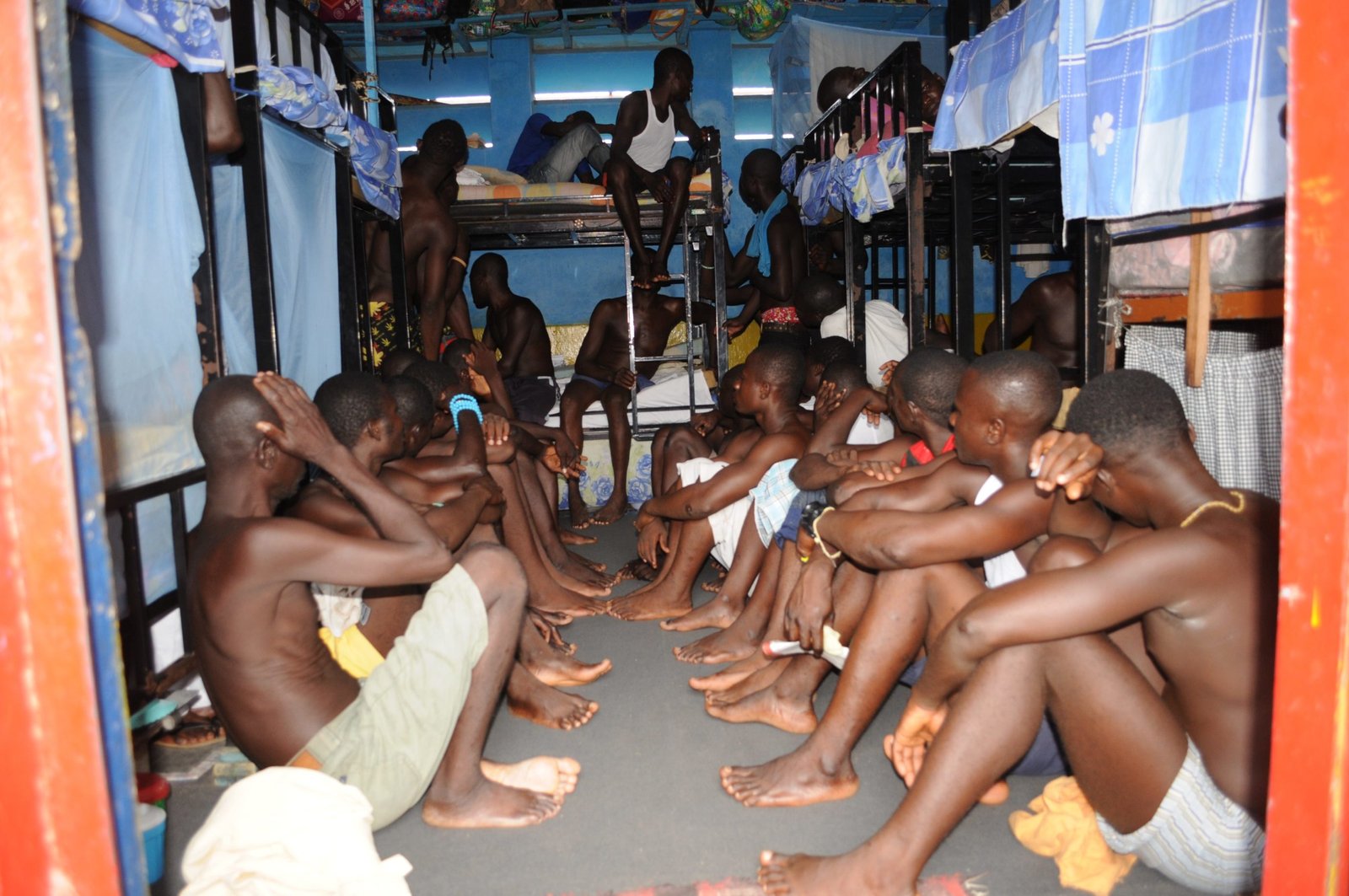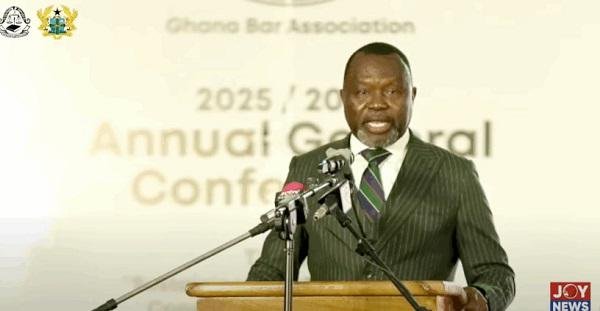News
Plight of inmates at Kumasi Central Prisons Banku,‘Keta school boys’ soup served daily

The consumption of rice as a staple food may be very common in many homes, but this is not so at the Kumasi Central Prisons where inmates enjoy the staple once in a year, specifically during the Christmas festivities.
For the inmates, their daily bread has been ‘banku and keta schoolboys’ soup.
According to the Deputy Director of Prisons, James B. Mwinyelle, the Ashanti Regional Commander of Prisons and Officer in- charge of the Kumasi Central Prisons, serving inmates rice would require a total of 16 bags of the 50kg rice bags.
Speaking to The Spectator, he said though gari was a good alternative, it remains expensive for the Prisons authority for the large number of the inmates.
“The authorities cannot even afford gari let alone beans to serve as proteins, so we rely on ‘Keta school boys’ as a source of protein.”
“Rice is expensive; the authority cannot afford it for this number of inmates we are dealing with. It is reason why we may be considering rice for them at Christmas,” he noted.
According to the Regional Commander, the increasing number of inmates was a serious concern for the authorities.
Constructed in 1901 and expanded in 1935 to accommodate 500 inmates, the facility now houses 1,627 inmates with 1,214 being convicts and 230 offenders on remand with 82 being on trial.
“Feeding this number of inmates with a feeding grant of Gh¢1.80 per inmate a day to prepare food is a huge burden on the authorities,” he stated.
He said the poor feeding regime was creating a serious health issues for the inmates, two of whom have lost their lives.
The Deputy Director of Prisons further indicated that the poor feeding coupled with congestion and lack of space for exercise among the inmates needed urgent attention to protect them and thereby reduce the high cost of medical treatment which had become a great burden to the authority.
Bathing soap for the inmates, he mentioned, was a big headache for the authority as about Gh¢8,000.00 was needed every month to purchase carbolic soap for each inmate which would not last for two weeks.
He pointed out that it was important for the state to have a second look at the state of affairs of the prisons in the country and come out with urgent measures to address the situation.
He called for a review of the feeding grant and consider the Prisons proposal of between Gh¢7.00 and Gh¢10.00 for each inmate per day.
The Regional Commander also mentioned that the Kumasi Central Prisons had taken up serious vegetable farming to help with the feeding of the inmates.
He urged the public to come to the aid of the inmates, saying that the prisons was part of society and must be seen as such in order to avoid a situation where the place would be a harbinger for radicalisation.
The issue of the feeding grant has come at a time the Minister designate for Interior, Mohammed Muntaka Mubarak, has raised serious concerns about the deplorable state of Ghana’s prisons, particularly regarding the inadequate budget allocated for feeding inmates.
Speaking during his vetting before the parliamentary appointments committee on Friday January 24, Muntaka pledged to prioritise prison reforms if his nomination was approved.
The Asawase Member of Parliament (MP) lamented that the G¢1.80 daily feeding budget per prisoner, describing it as grossly insufficient and inhumane
From Kingsley E. Hope, Kumasi
News
Declare a state of emergency in parts of the country affected by illegal mining – Coalition Against Galamsey to Mahama

The Coalition Against Galamsey is asking President John Mahama to declare a state of emergency in areas badly affected by illegal mining.
According to the Convenor of the Coalition, Dr. Kenneth Ashigbey, the situation has gone beyond control and requires urgent action to save lives and protect the environment.
He explained that the Constitution allows a state of emergency to be declared when the actions of criminals threaten essential resources such as water, safety, and the survival of communities.
He said illegal miners were destroying water bodies and depriving large communities of clean drinking water, which is an “essential of life.”
Dr. Ashigbey stressed that the call was not for the entire country, but only for parts of Ghana where the destruction is severe.
He added that declaring a state of emergency in these areas will give government the legal power to act quickly and decisively.
He also called on the President to provide clear timelines and targets to guide the fight against galamsey.
This, he said, would help demonstrate government’s seriousness and commitment to ending the menace.
The Coalition insisted that declaring a state of emergency was no longer a last resort but an immediate step needed to save Ghanaians and protect the future of the country.
By: Jacob Aggrey
News
The Ghana Bar Association must be non-partisan in the discharge of their duties – Dominic Ayine urges

The Attorney General and Minister for Justice, Dominic Ayine, has called on the Ghana Bar Association (GBA) to remain non-partisan in the discharge of its duties.
He said the credibility of the legal profession would be at risk if the bar allowed itself to be influenced by political interests.
Speaking at the GBA 2025/ 2026 annual general conference, Dr. Ayine reminded members that their first allegiance was to the Constitution and the Republic, not to any government or opposition party.
He stressed that for over three decades, the GBA had played an important role in helping the Supreme Court interpret and enforce the law, but outside the courtroom, its advocacy had often lacked consistency.
Dr. Ayine pointed to past cases such as the 2015 petition against the former CHRAJ Chairperson, Loretta Lamptey, and the 2017 petition for the removal of Electoral Commission Chairperson, Charlotte Osei, where the bar remained silent.
He noted that the association only found its voice during the petition against former Chief Justice Gertrude Torkornoo, a stance he said coincided with the position of the opposition.
He questioned why the bar acted differently in those situations, especially since all three cases involved women of repute who held positions in key constitutional bodies.
Dr. Ayine urged the GBA to be the conscience of the republic, saying lawyers must defend the rule of law, the independence of the judiciary, and the rights of citizens regardless of which political party was in power.
He warned against inviting foreign interference in Ghana’s constitutional matters, saying international collaboration should be limited to professional exchanges and not politics.
He further encouraged the GBA to promote integrity among its members, strengthen pro bono services to support the poor, and embrace digital reforms such as e-filing and electronic court records to modernize the justice system.
According to him, the destiny of Ghana is tied to the integrity of the legal profession.
He added that if lawyers stand firm, the country will also stand firm, but if they falter, the republic will stumble.
By: Jacob Aggrey














